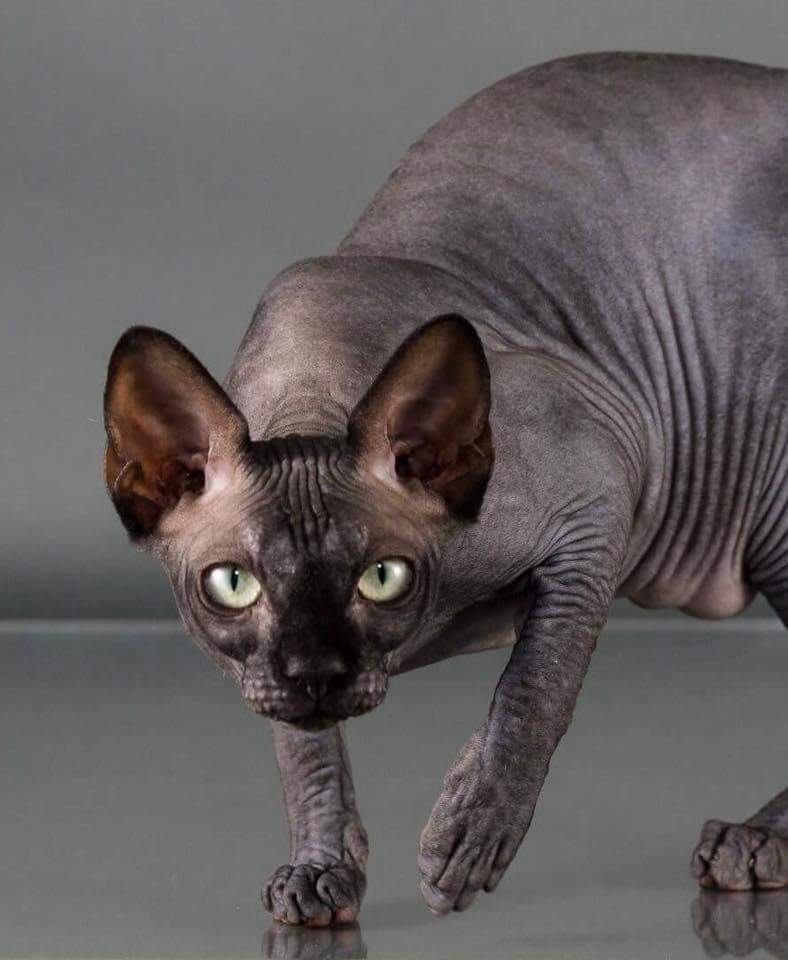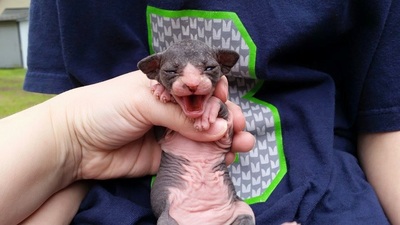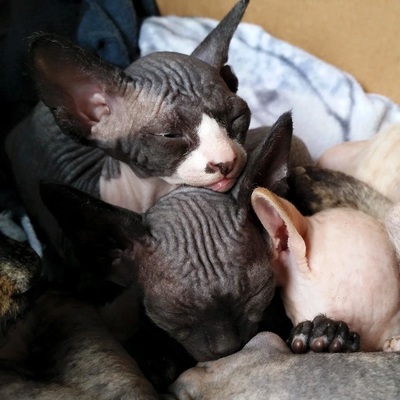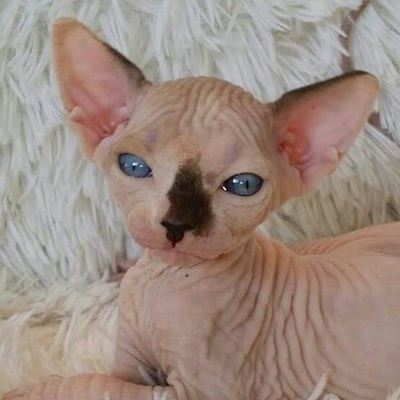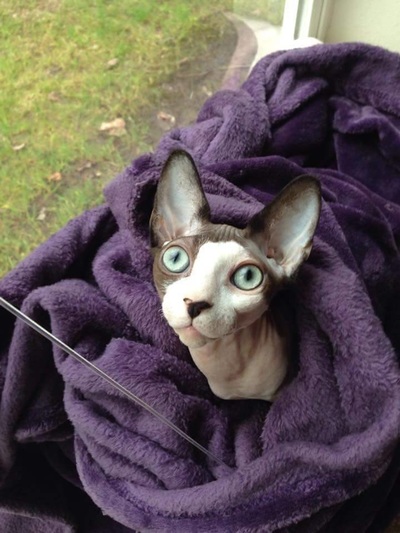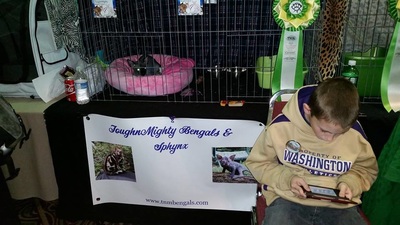In 1966 a domestic cat gave birth to a hairless kitten in Toronto Canada. When taken to a vet, it was discovered to be a natural genetic mutation and the Sphynx cat, as we know it today, came into existence. This cat and a few other naturally hairless cats have been found worldwide; produced by Mother Nature, they are the foundation for this unusual breed. While quite rare, there are still cases of a hairless kitten being born in domestic litters or feral colonies. (Both parents have to carry this recessive gene to produce hairless kittens).
However, Sphynx are not the only hairless breed nor are they completely hairless.
Donskoy's and Peterbalds are not types of Sphynx but different breeds entirely with different genetic makeups. Cat breeders in North America and Europe have bred the Sphynx to normal coated cats and back to hairless cats for more than thirty years. The purpose of selective breeding such as this was to create a genetically sound cat with a large gene pool and hybrid vigor. When properly bred, the Sphynx is a very robust breed with few serious health or genetic problems.
Sphynx are susceptible to HCM (hypertrophic cardiomyopathy).
Breeders are recommended to screen all their breeding adults for signs of this heart disease on a yearly basis by a veterinary cardiologist. Screening negative means the cat is currently showing no signs of the disease but not a guarantee that this disease wont manifest later in life.
Currently, there is no DNA test for HCM in Sphynx Cats. We will not buy ANY Sphynx from a breeder that doesn't screen for HCM every single year. Breeders who don't check for HCM by echocardiogram are basically play Russian Roulette with their breeding program. Crossing fingers and "hoping" your cats don't have this disease is not a way to keep your program healthy or protect the lives you are bringing into this world.
UPDATED DECEMBER 2020***NC State Veterinary Genetics Lab after more than a decade of research has identified one gene mutation thought to be responsible for approximately 60% of the cases of HCM in the Sphynx breed. All our current and past adult cats will be DNA swabbed and tested for this gene mutation. More information is available on their website.
There are some breeders out there that say, we don't test because it wouldn't make a difference. WRONG. A echocardiogram is done of the heart each time we "screen" for HCM. They are looking for early signs of this disease AND any other diseases or genetic anomalies when we screen. We do not know if they are showing early signs of the disease or are affected UNTIL WE screen them. A breeder could unknowingly be breeding a cat with a genetic heart problem and selling the kittens to unsuspecting buyers if they do not screen their cats for the disease. Our cardiologist continues to use those old screenings to monitor the hearts development each year. Please don't buy from a breeder that can't show you proof of HCM screenings on their adult cats on a yearly basis.
Fun fact! Canadian Sphynx cats are not totally hairless and there are different degrees of “hairless-ness.” There can be a fine down on the body which makes the cat feel like a warm peach. Some short hair is usually present on the nose, ears and sometimes on toes and tail. This is also allowed in show to a minimal degree. Seasonal, environmental and hormonal changes in the cat may also effect hair development. Some Sphynx have broken or a few whiskers while others have none. No breeder of Sphynx can guarantee your cat will not grow or lose fuzz in their lifetime. We also test our cats for the Devon Rex/Sphynx coat mutations by DNA.
The texture of Sphynx skin has been compared to a suede hot water bottle or warm chamois, and some cats almost have a buttery feel to the skin. The skin is loose on the body which leads to that extra wrinkling effect you see on the cat. All colors and patterns are possible and may be presented at any stage of maturity. The color and/or pattern of the cat are seen in the pigment of the skin and the few hairs that are present.
One of the most often questions asked about Sphynx is, “Don’t they get cold?” If your house or outside is too cold for you, then it will probably be too cold for a hairless cat. However, these cats are smart enough to find a warm spot in the house, a heated bed, curl up with a dog, cat or warm human, on top of your computer, or they will be snuggled under your bed covers. If you notice the paws, nose or ears feel cold, you may need to turn up the heat slightly or get them a heated bed. However, if you are comfortable, they likely will be too. They do not need extreme temperatures to thrive. Our house averages between 67 - 72 degrees depending on the time of year, and they rarely wear clothing and are very comfortable. However, unless supervised they are not a breed that should roam or be allowed outside. They cannot survive extreme temperatures and can even get sunburnt.
Sphynx are medium sized substantial cats and should not be fragile or delicate in any way. As with most cats, adult males are larger than females. Females tend to average from 7-10 pounds and males a few pounds heavier (9-13 pounds). Sphynx have sturdy boning, good muscle development and a bit of a firm round belly as if they just finished a nice dinner (slight pot belly is actually in our standard but not overweight or unhealthy of course). They have an open-eyed, lemon shaped and intelligent expression with extra wrinkling on their head which some see as a worried or inquisitive look. Sphynx are extremely lovable, known to perform silly antics and can be downright clumsy in their attempts to be the center of attention. They have abundant energy and are mischievous, always wanting to be with you, on you or showing off for you. Sphynx seem to prefer human attention but enjoy the company of dogs and all other breeds of cats if properly introduced.
Because of the lack of hair that would normally absorb body oils, Sphynx need bathing and monthly ear and nail clipping/cleaning. However (while each cat is an individual) we find the more you bathe, the more you strip their oils. Sphynx do NOT need to be bathed WEEKLY. That's major overkill and ruins their PH balance. Every other month to even every few months works best. Bathing does not tend to take a long time and is over semi quickly. Some of ours love it while some simply tolerate it. They are cats after all. We use Hylyt hypoallergenic shampoo here which is properly balanced for a pets PH balance. We like Epi Otic for ear cleaning and use a regular pet nail clipper to keep nails trimmed. We haven't found any extra oils, conditioners or even products geared towards Sphynx only are necessary. As with people, a good quality diet can also play a role in skin health and balance.
Hypoallergenic? Some people who suffer from cat allergies find that they can tolerate living with Sphynx over some other breeds depending on whether they are allergic to saliva, fur or dander. However depending on the type and severity of the individual’s allergic reactions, there are some who find they react to Sphynx. Especially since Sphynx still produce hair, saliva and dander. Sphynx are not allergy free and you should always meet a Sphynx before committing to owning one if you have pet allergies. No breeder can guarantee you will not have an allergic reaction to Sphynx.
Sphynx need a good quality diet. Any obligate carnivore does so in other words, all cats thrive on a quality high protein diet. Low to minimal grain, high protein and proper hydration is key to any healthy feline. We prefer a raw diet here at Mighty Bare but a great grain free, high protein wet/canned or freeze dried raw are also healthy options.
We feed a balanced raw diet here- usually twice a day but due to our work schedules also leave freeze dried (grain free) for them to eat when we work. Sphynx have high metabolisms so they do seem to eat more than other breeds but should never be allowed to get obese or unable to move around and play. On the opposite end of the spectrum a Sphynx that is skin and bones isn't healthy either. This shouldn't be a excessively lean breed. We don't mean that frequent vomiting or loose stools is normal. If your Sphynx never has solid bowel movements, throws up constantly, becomes obese or is very skinny- a vet trip is in order!
However, Sphynx are not the only hairless breed nor are they completely hairless.
Donskoy's and Peterbalds are not types of Sphynx but different breeds entirely with different genetic makeups. Cat breeders in North America and Europe have bred the Sphynx to normal coated cats and back to hairless cats for more than thirty years. The purpose of selective breeding such as this was to create a genetically sound cat with a large gene pool and hybrid vigor. When properly bred, the Sphynx is a very robust breed with few serious health or genetic problems.
Sphynx are susceptible to HCM (hypertrophic cardiomyopathy).
Breeders are recommended to screen all their breeding adults for signs of this heart disease on a yearly basis by a veterinary cardiologist. Screening negative means the cat is currently showing no signs of the disease but not a guarantee that this disease wont manifest later in life.
Currently, there is no DNA test for HCM in Sphynx Cats. We will not buy ANY Sphynx from a breeder that doesn't screen for HCM every single year. Breeders who don't check for HCM by echocardiogram are basically play Russian Roulette with their breeding program. Crossing fingers and "hoping" your cats don't have this disease is not a way to keep your program healthy or protect the lives you are bringing into this world.
UPDATED DECEMBER 2020***NC State Veterinary Genetics Lab after more than a decade of research has identified one gene mutation thought to be responsible for approximately 60% of the cases of HCM in the Sphynx breed. All our current and past adult cats will be DNA swabbed and tested for this gene mutation. More information is available on their website.
There are some breeders out there that say, we don't test because it wouldn't make a difference. WRONG. A echocardiogram is done of the heart each time we "screen" for HCM. They are looking for early signs of this disease AND any other diseases or genetic anomalies when we screen. We do not know if they are showing early signs of the disease or are affected UNTIL WE screen them. A breeder could unknowingly be breeding a cat with a genetic heart problem and selling the kittens to unsuspecting buyers if they do not screen their cats for the disease. Our cardiologist continues to use those old screenings to monitor the hearts development each year. Please don't buy from a breeder that can't show you proof of HCM screenings on their adult cats on a yearly basis.
Fun fact! Canadian Sphynx cats are not totally hairless and there are different degrees of “hairless-ness.” There can be a fine down on the body which makes the cat feel like a warm peach. Some short hair is usually present on the nose, ears and sometimes on toes and tail. This is also allowed in show to a minimal degree. Seasonal, environmental and hormonal changes in the cat may also effect hair development. Some Sphynx have broken or a few whiskers while others have none. No breeder of Sphynx can guarantee your cat will not grow or lose fuzz in their lifetime. We also test our cats for the Devon Rex/Sphynx coat mutations by DNA.
The texture of Sphynx skin has been compared to a suede hot water bottle or warm chamois, and some cats almost have a buttery feel to the skin. The skin is loose on the body which leads to that extra wrinkling effect you see on the cat. All colors and patterns are possible and may be presented at any stage of maturity. The color and/or pattern of the cat are seen in the pigment of the skin and the few hairs that are present.
One of the most often questions asked about Sphynx is, “Don’t they get cold?” If your house or outside is too cold for you, then it will probably be too cold for a hairless cat. However, these cats are smart enough to find a warm spot in the house, a heated bed, curl up with a dog, cat or warm human, on top of your computer, or they will be snuggled under your bed covers. If you notice the paws, nose or ears feel cold, you may need to turn up the heat slightly or get them a heated bed. However, if you are comfortable, they likely will be too. They do not need extreme temperatures to thrive. Our house averages between 67 - 72 degrees depending on the time of year, and they rarely wear clothing and are very comfortable. However, unless supervised they are not a breed that should roam or be allowed outside. They cannot survive extreme temperatures and can even get sunburnt.
Sphynx are medium sized substantial cats and should not be fragile or delicate in any way. As with most cats, adult males are larger than females. Females tend to average from 7-10 pounds and males a few pounds heavier (9-13 pounds). Sphynx have sturdy boning, good muscle development and a bit of a firm round belly as if they just finished a nice dinner (slight pot belly is actually in our standard but not overweight or unhealthy of course). They have an open-eyed, lemon shaped and intelligent expression with extra wrinkling on their head which some see as a worried or inquisitive look. Sphynx are extremely lovable, known to perform silly antics and can be downright clumsy in their attempts to be the center of attention. They have abundant energy and are mischievous, always wanting to be with you, on you or showing off for you. Sphynx seem to prefer human attention but enjoy the company of dogs and all other breeds of cats if properly introduced.
Because of the lack of hair that would normally absorb body oils, Sphynx need bathing and monthly ear and nail clipping/cleaning. However (while each cat is an individual) we find the more you bathe, the more you strip their oils. Sphynx do NOT need to be bathed WEEKLY. That's major overkill and ruins their PH balance. Every other month to even every few months works best. Bathing does not tend to take a long time and is over semi quickly. Some of ours love it while some simply tolerate it. They are cats after all. We use Hylyt hypoallergenic shampoo here which is properly balanced for a pets PH balance. We like Epi Otic for ear cleaning and use a regular pet nail clipper to keep nails trimmed. We haven't found any extra oils, conditioners or even products geared towards Sphynx only are necessary. As with people, a good quality diet can also play a role in skin health and balance.
Hypoallergenic? Some people who suffer from cat allergies find that they can tolerate living with Sphynx over some other breeds depending on whether they are allergic to saliva, fur or dander. However depending on the type and severity of the individual’s allergic reactions, there are some who find they react to Sphynx. Especially since Sphynx still produce hair, saliva and dander. Sphynx are not allergy free and you should always meet a Sphynx before committing to owning one if you have pet allergies. No breeder can guarantee you will not have an allergic reaction to Sphynx.
Sphynx need a good quality diet. Any obligate carnivore does so in other words, all cats thrive on a quality high protein diet. Low to minimal grain, high protein and proper hydration is key to any healthy feline. We prefer a raw diet here at Mighty Bare but a great grain free, high protein wet/canned or freeze dried raw are also healthy options.
We feed a balanced raw diet here- usually twice a day but due to our work schedules also leave freeze dried (grain free) for them to eat when we work. Sphynx have high metabolisms so they do seem to eat more than other breeds but should never be allowed to get obese or unable to move around and play. On the opposite end of the spectrum a Sphynx that is skin and bones isn't healthy either. This shouldn't be a excessively lean breed. We don't mean that frequent vomiting or loose stools is normal. If your Sphynx never has solid bowel movements, throws up constantly, becomes obese or is very skinny- a vet trip is in order!
Update: 8/3/2020 © 2022 - 2013 by Mighty Bare Sphynx • All rights reserved. Text, photos, graphics, videos and HTML code are protected by US and International Copyright Laws, and may not be copied, reprinted, published, translated, hosted, or otherwise distributed by any means without explicit permission.
